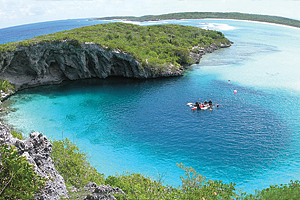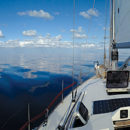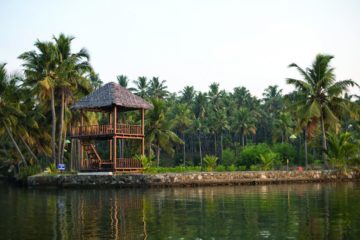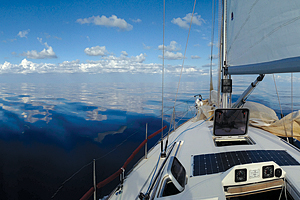
LESS IS MORE
During the past few years, thanks to the way we employ technology, our way of life has taken a dizzying turn. Everything is on fast forward. We’re living in the age of speed; it takes hours to travel between towns, countries or even continents; we eat fast, we’re having phone conversations non stop, we’re always online lest we miss some crucial bit of information, everything happens blindingly fast.
We’re permanently busy, never having much time for anything and events always seem to overwhelm us. We can do anything and everything, and we intend to do anything and everything, as we want ever more and more.
Most people work eight hour days their entire lives, spend their carefully counted days off resting after yet another year of drudgery, take on mortgage on top of credits on top of loans, buy houses and cars they can’t really afford and, somewhere between all that, get caught in the merry-go-round that their life is and forget to live it.
Lelia and Jeff decided to step off this centrifuge and retired early. They sold their car, house and furniture, placed all their books and records in a storage locker, and left their perfectly regular life in Australia for America, with a plan to buy a cruise boat on which to spend the years to come.
Lelia is an architect who left Romania during the eighties. She settled in Australia, where she met Jeff, a yachting enthusiast. The first boat they owned was actually built by himself. After meeting Lelia, a friend and former university colleague of my mother, I was impressed by the unpretentiousness with which she spoke of their travels. A very friendly, composed and balanced character, she recounted how everything began; how they had planned this trip quite a few years ahead, and explained how she didn’t see anything out of the ordinary about it at all since there are many other people who decide to live the same way.
In a society that sees everybody wanting more, the have decided to live with less. Life on the boat imposes a certain set of limitations and a rather minimalist lifestyle, if for no other reason than that there just isn’t enough room on it for everything you might wish for. Fresh water is scarce as well, turning dishwashing, showering, doing the laundry and even cooking into difficult-to-master art forms.
In the autumn of 2007, after only three weeks, a few internet searches and a couple of boats seen, they found it: the Ivory Moon, a 1989 Island Packet that had spent the past 15 years in fresh water, going out only on weekends. Nowadays, over five years have passed since the moment when they reached that turning point in their lives and they became fulltime tourists, visiting countries most people only see on National Geographic. They set forth from Deltaville, Virginia, where they had bought the boat, and went on to the Bahamas, Florida, Cuba, Trinidad, the Cayman Islands, Honduras, Belize, Antigua, Guatemala, Brazil, Mexico, Panama, Columbia, Miami, and the Bermuda.
What I found really interesting wasn’t just the impressive list of countries – which would put any tourism leaflet to shame – but more so the way they had visited those places. They would moor in a port, shoulder their backpacks and proceed to see whatever was worth seeing.
They would stop overnight in quaint places that Lelia would pick, being keen as she is on historical buildings with a story to tell. This luxury of leisurely sightseeing; coming in direct contact with local traditions, witnessing the ways of life of people from different parts of the world, going to a Sunday market or fair and, although briefly, becoming one with the natives, is a far cry from the conventional way of vacationing in an exotic country, in an umpteen-star all-inclusive. After three and a half years in and around the Caribbean, they crossed over the Atlantic towards the Azores, going on to explore Portugal, Spain and Morocco. All their stories and exploits can be found on their online blog cruisingmoon.wordpress.com.
Following my talk with Lelia, I came to the conclusion that my perception of what living on a boat meant was entirely wrong. Apart from the simple lifestyle, with fewer possessions and more time to enjoy the simple pleasures like cooking, fishing, or sightseeing, I had no idea that those who choose this way of living also maintain a very active social life. Every port they stopped in saw them making new friends, with some of whom they kept in touch and even managed to meet again later on.
There are cruiser communities for various areas around the world, each with their respective forum. Parties are being organized, sometimes on some island, sometimes even on water, by tying together several dinghies (the small, inflatable boats that one uses to reach the shore in those ports where the anchor must be cast in open waters) thus forming evanescent pseudo-islands. I’ve never imagined how technology – internet, radio and another instrument I had no idea existed, called an SSB and extensively used in cruising as it allows access to weather forecasts without the need for an internet connection – makes it possible for people on various boats to stay in touch, always communicating, sending each other details regarding the weather, their position or even planning get-togethers.
Reading their blog, you’ll find out that, on a boat, something is always broken, malfunctioning or in need of repairing, tuning or upgrading. That much needed component is, again thanks to the internet, very easy to track down to a place more or less nearby, and the days on end spent in some port for a repair can also be a perfect opportunity to see new places and meet new people.Indeed, as Lelia put it, what they do is nothing out of the ordinary. There are plenty others who do it, some bringing their babies along, others on their very own, some looking for adventures, others seeking peace of mind and tranquility, but each one with a differently valid reason for choosing to live on a boat.
If you look at it from the right angle, it may even seem a most natural thing. Obviously, we couldn’t all sell everything we own and move residence on boats, but I think we could at least try and slow down a bit, step off the speeding train of everyday life and enjoy the things we truly love. Find our very own Ivory Moon and use the technology at hand in our speed-obsessed world to create enjoyable moments. For time goes by at its own speed,
regardless of how intensely we live our lives.









